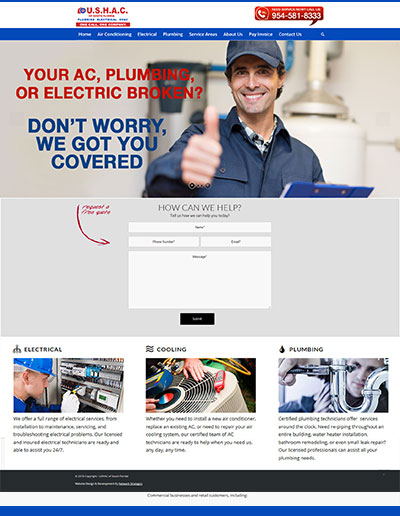We Create Websites that
Website Audits
We could have designed rockets, but we chose to help our clients with:
Why Businesses Should Use Website Audits
Website audits are an essential practice for businesses seeking to optimize their online presence. They offer several compelling reasons why businesses should prioritize website audits:
In today’s digital landscape, cybersecurity is a top priority. Website audits provide a complete evaluation of a website’s security measures, identifying vulnerabilities, potential risks, and weaknesses. By addressing these issues, businesses can fortify their website’s defenses, protect sensitive data, and build trust with their audience.
User experience is a critical factor in attracting and retaining visitors. Website audits delve into usability and user experience, scrutinizing design flaws, accessibility barriers, and navigational challenges. Through careful analysis, businesses gain insights on how to create a seamless user journey, optimize content placement, and streamline navigation for a more engaging and intuitive experience.
Visual appeal and a consistent brand identity are paramount in establishing a strong online presence. Website audits thoroughly assess design elements, branding consistency, color schemes, typography, and imagery. Furthermore, audits evaluate a website’s responsiveness across various devices, ensuring it adapts seamlessly to different platforms. By optimizing design and responsiveness, businesses can create an immersive user experience that resonates with their target audience.
Need A Website Audit?
Need to talk to a website audit pro about your business goals?
The Power of Website Audits
Website audits are a powerful tool that provides businesses with a comprehensive evaluation of their online presence. By examining various aspects of a website, audits offer valuable insights and recommendations for improvement, helping businesses unlock their full potential. Here’s an in-depth look at the power of website audits:
Website audits provide a holistic assessment of a website, analyzing multiple facets such as security, usability, design, responsiveness, loading speed, SEO optimization, keyword ranking, and broken links. This comprehensive evaluation ensures that no aspect of the website is overlooked, enabling businesses to address any weaknesses and optimize their online presence.
Website audits are based on thorough data analysis, using tools and techniques to collect and analyze relevant metrics. This data-driven approach allows businesses to make informed decisions about their website, as they have a clear understanding of its performance, strengths, and areas for improvement. By relying on concrete data, businesses can prioritize and implement changes that have a positive impact on their website’s performance and user experience.
Website audits provide actionable insights and specific recommendations for improvement. Whether it’s addressing security vulnerabilities, improving user experience, optimizing website design, or enhancing loading speed, audits highlight specific areas that require attention. This enables businesses to take targeted actions, making the necessary adjustments to enhance their website’s performance and meet their goals.
What is a Website Audit?
Website audits involve a comprehensive evaluation of a website’s various aspects, including security, usability, user experience, design flaws, responsiveness, loading speed, SEO optimization, keyword ranking, and broken links. Each aspect plays a crucial role in maximizing a website’s potential.
A security audit aims to identify potential vulnerabilities and risks in a website’s security measures. It examines factors such as SSL certificates, encryption protocols, firewalls, and authentication mechanisms. By conducting a thorough security audit, businesses can identify and address security gaps, ensuring the protection of sensitive information and safeguarding against cyber threats.
This type of audit assesses the website’s ease of use, intuitiveness, and overall user experience. It evaluates factors such as navigation structure, content layout, clear calls-to-action, and mobile-friendliness. Through a usability and user experience audit, businesses gain insights into improving the website’s usability, optimizing content placement, and creating a seamless user journey.
The design flaw audit focuses on scrutinizing the visual elements and aesthetics of a website. It assesses factors such as branding consistency, color schemes, typography, imagery, and overall visual appeal. By identifying and addressing design flaws, businesses can create a visually cohesive and engaging website that aligns with their brand identity.
With the prevalence of mobile devices, a website must be responsive and adapt to various screen sizes. The responsiveness audit evaluates how well a website performs across different devices and platforms, ensuring a seamless user experience regardless of the device used. By optimizing responsiveness, businesses can reach a wider audience and provide a consistent experience.
Website loading speed is a critical factor for user satisfaction and search engine rankings. The loading speed audit examines factors such as file sizes, server response time, caching mechanisms, and code optimization. By identifying bottlenecks and implementing performance enhancements, businesses can reduce loading times, improve user experience, and increase the likelihood of conversions.
Search engine optimization (SEO) is essential for driving organic traffic and increasing online visibility. The SEO optimization audit analyzes factors such as keyword usage, metadata, URL structure, internal linking, and sitemap. By optimizing these elements, businesses can improve search engine rankings, drive targeted traffic, and expand their online presence.
A keyword ranking audit focuses on assessing a website’s performance in search engine rankings for target keywords. It involves analyzing keyword usage, competition, search volume, and current rankings. By understanding keyword performance, businesses can refine their SEO strategies, target relevant keywords, and improve their website’s visibility in search engine results.
Broken links can negatively impact user experience and search engine rankings. The broken link audit involves identifying and resolving broken links within a website’s internal and external links. By ensuring all links are functioning correctly, businesses can maintain a seamless browsing experience, improve SEO performance, and enhance user satisfaction.
Need Website Audit Services?
Need to improve your marketing strategy? Optimize your website, rebrand or generate leads? We would love to work together with your project.
Benefits of Website Audits
Website Audits have numerous advantages for businesses of all sizes:
Enhanced User Experience and Engagement
Website audits focus on assessing the usability, design, and overall user experience of a website. By identifying usability issues, design flaws, and navigational challenges, businesses can make targeted improvements to enhance user experience. This includes optimizing the website’s layout, improving navigation structure, and ensuring intuitive user interactions. A better user experience leads to increased user engagement, longer website visits, and higher chances of conversions.
Improved Search Engine Visibility and Organic Traffic
A website audit analyzes the website’s SEO performance, keyword usage, metadata, and link structure. By implementing SEO best practices based on audit findings, businesses can improve their search engine visibility and attract more organic traffic. This includes optimizing on-page elements such as meta tags, headings, and content, as well as improving off-page elements such as backlinks and internal linking. Increased search engine visibility leads to higher rankings in search engine results pages (SERPs), resulting in more targeted organic traffic and improved brand visibility.
Enhanced Website Security and User Trust
Website audits assess the security measures in place to protect sensitive data and user information. By identifying vulnerabilities, potential risks, and weaknesses, businesses can implement necessary security enhancements, such as SSL certificates, encryption protocols, and firewall configurations. A secure website builds trust with users, assures them that their data is protected, and safeguards against potential cyber threats or data breaches. This enhances the credibility and reputation of the business, fostering long-term customer loyalty and trust.
Optimized Website Performance and Loading Speed:
Website audits evaluate various technical aspects that impact website performance, such as loading speed, server response time, and code optimization. By addressing issues identified during the audit, such as optimizing image sizes, leveraging caching mechanisms, and reducing server requests, businesses can significantly improve website performance. A faster-loading website not only enhances user experience but also reduces bounce rates and improves search engine rankings. Users are more likely to engage with a website that loads quickly, resulting in higher user satisfaction and increased conversions.





